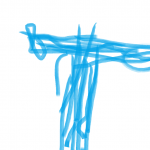Siproena Johnson
As Poetry Recycles Neurons
May.27.13
Neuro Reverie Week 9
Word Count 175
“Emotions course through the veins, engage the heart and the lungs, the bowels and the genitals, the muscles, the skin and face. As for cognition, do we not think, literally here, with hands and eyes?” (P. 230 Rose, Abi-Rached)
Energy flows through human body in the most intriguing ways.
Suppression of feeling leads ultimately to massive outbursts,
Adrenalin rushes through this body, redirecting the senses.
Epinephrine also known as adrenaline or adrenalin
Why to such length is this masking of feelings taught from early childhood to old age?
An outlet must be available without fear of reprimand.
Desire to direct the energy finds the tools are often near.
Here, as music plays, this outlet lies in my hands.
Paper; plain or decorated, can be found manipulated to some degree.
Paper; solid colored or with lines, the imagination can be set free.
To, and with these, writing instruments, hands and mind can combine.
Creative usually, and even compulsive, these manners are put to the test.
These tools readily in hand give the mind some ease and focus with an outcome its own conciliation.
Design and form are at the fingertips as the eyes scan diagrams on a page.
Eventually the mind on autopilot can take hold and the outcome can even leave its creator amazed.

